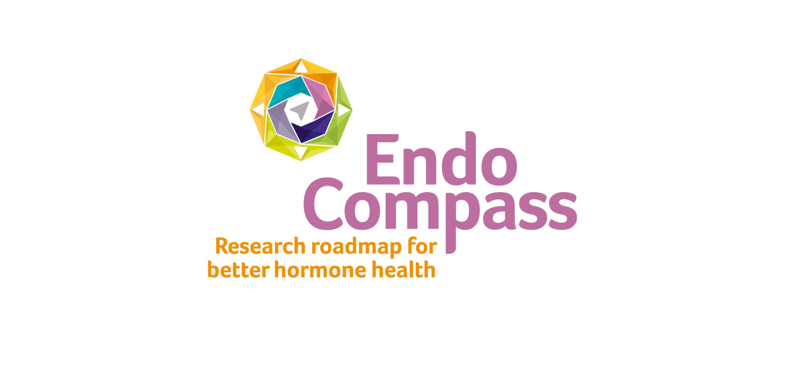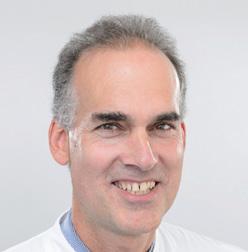
9 minute read
Why we all need EndoCompass
from Endocrine Views (ESE News) Spring 2024 (News and Views European Society of Endocrinology) Issue 53
Martin Fassnacht, co-Chair of the EndoCompass Project, shares his perspective on its importance for European endocrinology.
What is EndoCompass?
EndoCompass is a major collaborative initiative, steered jointly by ESE and the European Society for Paediatric Endocrinology (ESPE), to identify and share the research priorities in endocrinology for the coming decades. Here, endocrinologists give you an insight into the purpose of the project and the activities that are taking place to ensure it reaps rewards for endocrine research and healthcare.Why does the endocrine community need EndoCompass?
How did you become involved in EndoCompass?
I have been involved in several ESE committees over the last decade. It has been an honour to be a member of the Executive Committee since 2021, first as Chair of the ESE Science Committee and now of the ESE Clinical Committee. As a result, I was invited to co-Chair EndoCompass when it launched almost two years ago.

Why does the endocrine community need EndoCompass?
Fostering research and scientific progress is one of the absolutely essential tasks of ESE. Good research requires funding, but European and national research and health policymakers and funding bodies are not always aware what is ‘hot’ or important in our field. EndoCompass aims to outline the specific research needs and opportunities in endocrine health and disease that, if included in future research calls and funding programmes, will contribute to better health in Europe. This project will serve as a ‘compass’ for endocrine research for the next 10−25 years.
Why is now the right time?
The European Commission is about to start work to continue the Horizon Europe programme, which includes funding for pan-European biomedical research. A number of national funding bodies are renewing their programmes too. This is a good time to provide direct feedback from the community.
What are the project’s main aims and outputs?
Our aim is to identify the priorities in endocrinology and endocrine science that have the greatest potential to improve health in Europe. Not only is this valuable for funding bodies, but also as guidance within and beyond the endocrine research community. We want to highlight the attractiveness of endocrinology to early career researchers, and give other stakeholders, such as industry, a clear vision of key areas of healthcare need and opportunities for development.
As well as publishing a synopsis of our findings in European Journal of Endocrinology, we will prepare a summary statement for policymakers, funding bodies and industry, using the most appropriate platforms to reach these target audiences.
What particular challenges must EndoCompass address?
Initially, it has been jointly establishing research priorities across the immense breadth of endocrine science. To do this, we have gathered a wide array of experts and adopted a structured approach to select the priorities in each research area. The next step involves distilling these priorities into a clear, compelling message and disseminating it broadly, to engage our diverse stakeholders. Our communication strategy will be crucial in amplifying the impact and reach of our research priorities.
Who is involved, and why?
To develop a ‘product’ to serve the entire endocrine community meant the whole community needed to be really involved and actively engaged. The ESE Executive Committee decided upfront to ask all our official and unofficial partner societies to contribute, with very successful engagement of a long list of Project Partner societies EXTERNAL-LINK-ALT . Crucially, the European Society for Paediatric Endocrinology (ESPE) agreed to be our joint collaborator, enabling us to cover endocrinology across the whole lifespan. All ESE National Partner Societies have been engaged via the ESE Council of Affiliated Societies (ECAS) EXTERNAL-LINK

To ensure coverage of all major endocrine topics and to recruit the corresponding experts, we structured the project around working groups which largely reflect the ESE Focus Areas EXTERNAL-LINK-ALT , asking the Focus Area Leads to gather corresponding groups of basic, translational and clinical scientists. It was also vital to engage early career researchers and patients, which we achieved via the ESE Young Endocrinologists and Scientists EXTERNAL-LINK-ALT and the ESE Patient Advocacy Groups EXTERNAL-LINK-ALT . Each working group now includes at least one young researcher, and there is a process to get feedback from as many patient groups as possible.
In summary, we are delighted that more than 150 enthusiastic people are already working on EndoCompass, with more set to join us.
How and when can members of ESE contribute?
ESE and ESPE members have been able to engage with and guide the project since April 2023, when we conducted the big Future of Endocrinology survey. Their responses have already been integrated into the decision-making process for the research priorities, and they will soon be able to see the result of their contributions. The draft roadmap paper will be available to all members around autumn 2024, and their comments will be implemented in the final published version.
When should we expect to see the first outputs?
Key results will be presented at the Joint Congress of ESPE and ESE 2025 in Copenhagen, Denmark, and we plan to publish the scientific paper on EndoCompass in European Journal of Endocrinology in summer 2025. In parallel, ESE will launch a campaign including press releases and social media events etc., to ensure all stakeholders are aware of EndoCompass.
When will EndoCompass start to make an impact?
Even before publication of the paper, the project’s key conclusions will be used to drive the discussion at national and European levels regarding areas of need in endocrine research. The aim is for these priorities to be reflected in EU calls as soon as 2028. We should see some of the fruits of our labours in the call for the next EU flagship programme for research and innovation, which is due to start in 2028.
Martine Cools
EndoCompass Steering Committee Member, responsible for co-ordinating ESPE’s participation
Please introduce yourself
I am Chair of the ESPE Science Committee, and a member of the ESPE Council. I am Head of the Department of Paediatric and Adolescent Endocrinology and Diabetology at Ghent University Hospital, and Full Professor in Paediatric Endocrinology at Ghent University in Belgium. My interests include gonadal development, variations of sex development, adrenal and pituitary pathology, paediatric gynaecology, Turner syndrome, and care for transgender youth.
Why do we need the EndoCompass project now?
Apart from diabetes and obesity, endocrinerelated diseases are poorly known by the broader public and insufficiently targeted by large European funding programmes. Nonetheless, the endocrine system has a major impact on our daily functioning and many of the current societal challenges impact on our endocrine system. Thus, strengthening endocrine research can be part of Europe’s response to some of the major concerns of today, e.g. environmental disruption, climate change, mental stress, fertility decline, healthy ageing etc.
What positive change can EndoCompass bring?
Many adult diseases have their origin in childhood, or even in fetal life, and/or can emerge in individuals through transgenerational effects. EndoCompass has the power to illustrate and further explore this concept, through collaboration between basic and clinical researchers with a background in paediatric or adult endocrinology. EndoCompass can show that investing in healthy fetuses may have positive effects, even more than 40 years later! I hope this insight will be a game changer in European health-related research.
Why are you excited to be involved?
I enjoy the very broad scope of the project, and the mutual knowledge exchange between paediatric and adult endocrinology, which has the potential to bring these two disciplines much closer to each other.
Heleen Jansen
Early career researcher in the EndoCompass Thyroid Working Group
Please introduce yourself
I am a medical doctor, currently finishing my PhD in the Endocrine Laboratory at Amsterdam University Medical Center in The Netherlands. My research focuses on improvement and interpretation of thyroid hormone measurements.
Why do we need the EndoCompass project now?
It will help to critically determine research priorities among a diverse group of researchers in the same area of endocrinology. European collaboration is increasingly important, and the EndoCompass project will allow us to align research in these areas at an early stage.
What positive change can EndoCompass bring?
I have noticed that research priorities are often similar among groups from various countries or institutions. EndoCompass could increase collaboration between groups, thereby enhancing the quality of research. It is important that researchers in the field, who will ultimately conduct the studies, identify the long term priorities, to provide guidance to policymakers or funding institutions.
Why are you excited to be involved?
The EndoCompass project offers a unique opportunity to discuss current and future research projects in my area of interest, from various countries and perspectives. It has broadened my knowledge regarding opportunities. The atmosphere within the Thyroid Working Group is open and stimulating, giving me a platform as a young researcher to contribute and have an impact on research.
Mehul Dattani
Lead for Paediatric Endocrinology in the EndoCompass Pituitary Working Group
Please introduce yourself
I am Professor of Paediatric Endocrinology at the UCL Great Ormond Street (GOS) Institute of Child Health and a Consultant Paediatric Endocrinologist at GOS Hospital for Children and UCL Hospitals, London, UK. I have been a long-standing member of the ESPE Council, and am Meeting Host for ESPE 2024. While my research focuses on hypopituitarism in children and adolescents, my clinical work spans paediatric endocrinology.
Why do we need the EndoCompass project now?
Funding for endocrine research has remained challenging. It is important for the paediatric and adult endocrine communities to form a cohesive, collaborative group, to enable funding and continued progress in the era of multiomics. I hope EndoCompass will attract young investigators into endocrinology and fuel their enthusiasm.
What positive change can EndoCompass bring?
It will reinvigorate research and foster collaborations between basic and clinical scientists and paediatric and adult endocrinologists. Given the recent discoveries in genomics, the potential for translational research with the development of novel therapies is considerable. Additionally, the advent of single cell technologies, proteomics and epigenomics is likely to change the endocrine research landscape, ultimately benefiting European healthcare. Research into endocrine disruptors could improve health at a population level.
Why are you excited to be involved?
It will enable me to work with leaders across endocrinology to answer key research questions and improve patient care. I hope collaborations in other areas will be similarly productive, and that EndoCompass will herald a new era of research in endocrinology.
Key outputs
Detailed research roadmap of the nine areas of endocrine science: to be the basis for policy
High level summaries based on the roadmap, showing areas of need where investment can yield the highest societal return
Timescales
April 2023 - ‘Future of Endocrinology’ survey of members
May 2024 - draft of key priorities completed
Autumn 2024 - members give feedback on integrated draft
Find out more at www.ese-hormones.org/roadmap






